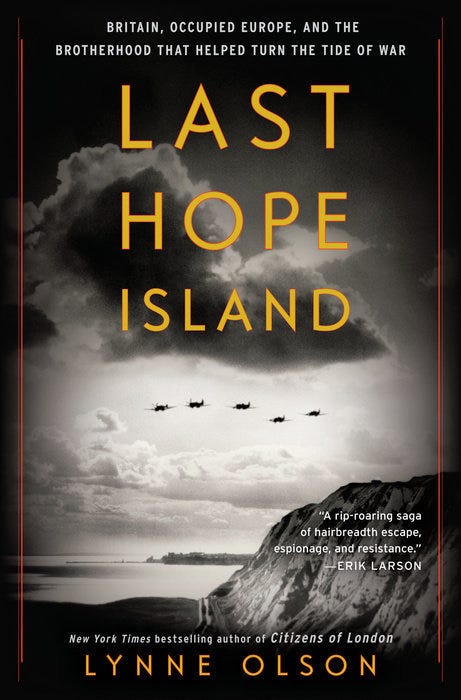Short Reviews for December 2024
Neptune's Brood, East, November 1918, Last Hope Island
Neptune's Brood, by Charles Stross (336 pp; 2013)
Who should read this? People who like good sci-fi spacepunk worldbuilding, and don't mind an ill-developed plot.
Stross gives us a fun quasi-spacepunk setting. Here, faster-than-light travel doesn't exist, and almost all interstellar travel is by laser beam uploading at high expense. Human-settled space is tenuously knit together by the interstellar financial system, which is based on blockchain and strands of debt left over from interstellar colonization trips. Our protagonist is a banking historian investigating incomplete attempted blockchain transactions.
That's the best part of the book - the tour of this universe, both what our protagonist sees and what she reminisces about worldbuilding and how things have gone wrong in the past.
Unfortunately, the actual plot isn't so good. It could've been - there's a great premise when we finally get it - but we don't hear any hints at the secrets our protagonist's actually investigating for at least half the book. And when we do hear it, our protagonist's agency largely evaporates as she gets pushed around by external forces. She makes one meaningful choice near the end... but it's only choosing whom to trust her fate to.
What's more, in the end, Stross turns out unwarrantedly negative on the whole financial system. Or perhaps it is warranted, depending on how we interpret the references to bonds of debt... but he hasn't developed that; hasn't shown us that colonies' founding-debt is a bad enough thing to warrant tearing the whole system down.
So, I'm left wishing this world had been given a better book.
East, by Edith Pattou (507 pp; 2003)
Who should read this? People who like good fairy-tale retellings and expansions.
I enjoyed this novelized retelling of the fairy tale "East of the Sun, West of the Moon". Pattou has introduced some very rich new elements woven into the skeleton of the fairy-tale.
Our protagonist and her family are all ably painted as well-developed characters, and the romance develops quietly but well. I like how she switches narrators and uses that to develop multiple perspectives very well. And, I especially appreciate how our protagonist decides to turn back at the climax for her beloved's sake, and then is convinced to keep going by a perfectly-pitched revelation. That was both a great character moment, and a great worldbuilding moment.
The only perspective I didn't think was well done was the goblin queen herself. We hear her villainy, but her inner voice seems too reasonable and doesn't match up to it. I can think back in retrospect and see how she's lying to herself, but that's only the case in retrospect when I try to piece together the loose ends. Perhaps that was intentional? Further pointing it out in the novel would've been tough given no one hears her inner monologue, but I do feel something was lacking there.
But that was just one minor flaw in a very fun book.
November 1918: The German Revolution, by Gerwarth Robert (352 pp; 2020)
Who should read this? People interested in the end of World War I, or the study of modern revolutions.
Robert views the overthrow of the German Empire from a contemporary perspective, arguing that it was a significant revolution and that the Weimar Republic (outside hindsight) wasn't an abortion or betrayal of the revolution's promise. I think he's technically proven his case, but little more.
Robert deservedly shows the decay of the Imperial government and its regressive nature, and how huge a change it was when it was overthrown. He also shows the huge chaos of the revolution, how conservatives had been discredited, and how a whole spectrum from liberal republicans to multiple types of Communists were jockeying for power. And then, a liberal-republican alliance got the upper hand, allied with the army to put down the Communists, and declared the Weimar Republic.
Yes, there was a huge change. Yes, a liberal democrat would say this was the promise of the revolution (though a Communist would disagree) - at least, inasmuch as it was possible given the Treaty of Versailles. But the steelman of the anti-Weimar case is that the Treaty, and the alliance with the army, were flaws at the heart of Weimar that would eventually betray the Revolution's promise. (Inasmuch as it had a specific promise in the first place - Robert shows how that was unclear!) Robert observes that Weimar's democracy outlasted most Eastern European countries - to which I would merely say they had flaws too.
So I still deem Weimar fundamentally flawed.
Last Hope Island: Britain, Occupied Europe, and the Brotherhood That Helped Turn the Tide of War, by Lynne Olson (576 pp; 2017)
Who should read this? People interested in the details of politics in World War II.
This's a history of the European governments-in-exile in London during World War II, and their often-stormy relations with their English hosts. It also dips some into the relations between England and the resistance movements, and the arguments within the Western Allies as to how much to depend on them, and - thanks to this - gives insights that could be used to explore many other parts of the war.
One theme that came out to me here is how the British didn't respect the governments-in-exile as partners. On the one hand, that set them up for resentment - as we see from de Gaulle after the war. But on the other hand, it was understandable given their exiled status and lack of resources - Norway was the only one paying its own way, and that from its ownership of its merchant fleet.
Another theme was how amateurly the British were fighting this war. They repeatedly ignored basic security precautions in sending secret agents and communicating with resistance movements, down to ignoring obvious signs that radio operators had been captured by the Germans - and when individual SOE people pointed it out, they were repeatedly overruled! For years, they refused to bring the governments-in-exile in on these operations, despite their local experience (which is where that lack of respect did make a difference).
But the West ended up having enough resources to be able to afford all their losses, from these faults and others.






Ok. I get it. You’re not gonna turn on payments. But, you don’t have to paywall anything. Just let me send you a few bucks for a steak.
I so completely appreciate what you do.